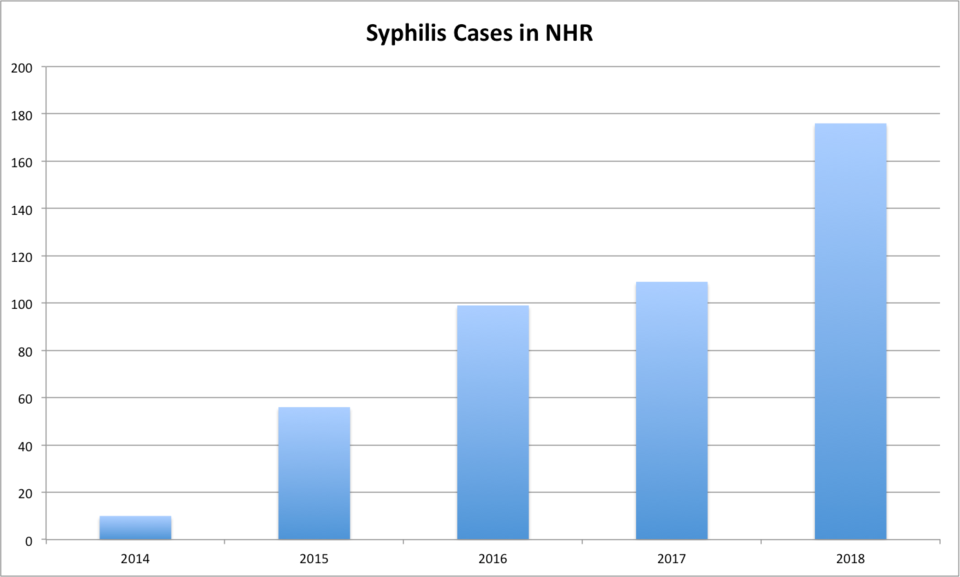The Northern Health Region (NHR) is taking steps to combat a syphilis outbreak. Around 100 cases have already been reported in the region in 2019, while only 10 cases were reported in the entire year of 2014.
“The outbreak that we’ve had going on for the past four years now seems to be getting worse,”said Dr. Michael Isaac, medical officer of health for the NHR.
“We’ve had some congenital syphilis cases over the past five years in northern Manitoba, which is very concerning.”
Congenital syphilis is passed from a mother to her developing baby. Four confirmed cases of congenital syphilis have been seen in the NHR since 2016. Issac said he would usually expect only one in that time frame.
“After we had our first congenital syphilis case, we implemented enhanced testing in pregnant women,”he said.
“Typically, a pregnant mom would get tested once in pregnancy. We put in place a policy where pregnant women would be tested three times in pregnancy.”
The Public Health Agency of Canada describes congenital syphilis as possibly deadly, noting prior to 2005, they saw two cases per year.
“Congenital syphilis can result in significant health problems to the infant including skin lesions, disseminated infection (infection throughout the body), enlarged liver and spleen, infection in the brain and even death. An infected baby may be born without signs or symptoms of the disease,”their website reads.
Issac said while some of the increase might be chalked up to higher awareness and testing, such a drastic uptick shows there is an outbreak.
“There has been some increased testing, which may lead to an increase in the numbers that we’re seeing, that certainly could be part of it,”he said. “But there’s no doubt that we’ve got an outbreak going on. There’s transmission from person to person that is significantly higher than what we’ve seen in the past.”
Syphilis is usually transmitted from person to person through genital to genital contact or oral/ genital contact.
“Condoms will help, something called a rubber dam will also help for oral sex,”Issac said.
“That will help to protect a person from being exposed to a syphilitic sore. Of course, abstinence is another way –the only way - to absolutely prevent yourself from getting syphilis, but we recognize that that might not be possible for some people.”
While syphilis can be dangerous, especially for pregnancies or if untreated for a long time, it is easily treated.
“Syphilis is curable, with a dose of long acting penicillin that a person can get through injection,”Isaac said. “You get one injection and you’re done, and you’re cured. So we’re trying to get the message out to that. It’s important to get tested and to know if you have the infection or not because it’s curable. But if you don’t get it treated, it can cause some long term damage for you.”
The ease of treatment and potential dangerous long-term effects are some of the reasons the NHR is focused on an awareness campaign, which isn’t just aimed at members of the public.
“There’s different ways to try and retain control of the outbreak,”Issac said. “Awareness certainly is one of them. Awareness, not only for folks in the community, but also for healthcare providers. Syphilis is not a disease that was all that common
four or five years ago, and many providers may not have seen a case of syphilis.”
Syphilis is part of a group of illnesses called sexually transmitted and blood borne infections (STBBI). Issac said other STBBI ailments like hepatitis B are on the rise in the north and added other illness could reach outbreak levels.
“We haven’t seen an increase as of yet in HIV, although I would say that we are at risk for an HIV outbreak in northern Manitoba,”he said.
“When you have a syphilis infection, you’re at higher risk of getting HIV. If you’re sharing drug injection equipment, you’re at high risk for getting HIV. So although our
numbers for HIV in the north haven’t gone up yet, I would say that we’re concerned that there potentially could be an outbreak in the future in the north.”
Many people with syphilis don’t have any symptoms. The only way to know for sure is to get tested. Tests can be scheduled at any time. For more information or to schedule a test, call the Primary Health Centre in Flin Flon, 204-687-1350.




